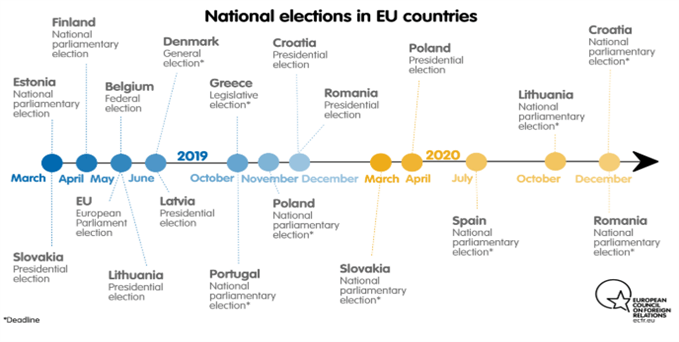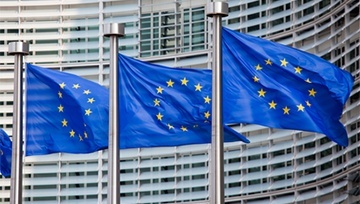TALKING POINTS – EURUSD FORECAST, EUROPEAN ELECTIONS, EUROPEAN PARLIAMENT
- Eurosceptic parties are projected to win up to one-third of seats in the EP
- Trade policies, fiscal regulations, sovereign bond markets may be at risk
- As a politically-sensitive currency, the Euro’s foundation may be shaken
See our free guide to learn how to use economic news in your trading strategy !
The Euro will be in for a tumultuous week ahead as the European Union holds its EU-wide parliamentary election. Eurosceptic parties are expected to make unprecedented gains, consequently putting greater pressure on the already-battered Euro. Traders with exposure to European assets will be on their toes throughout the election as the strength of Europe’s future – and the Euro – hangs in the balance.
WHAT ARE THE EUROPEAN PARLIAMENTARY ELECTIONS, HOW DO THEY WORK?
The European Parliamentary (EP) elections are a continental-wide election where citizens from each member state (MS) vote on local candidates to become members of the European parliament (MEPs). These officials will then occupy the legislative branch of the EU and will be primarily responsible for:
1. Passing European-wide laws
2. Overseeing the budget
3. Supervising, voting on and (if necessary) firing the EU Commission President
The election will take place from May 23-26 and will result in the appointment of 750 or possibly 705 MEPs who will serve a five-year term. The ambiguity over the number of seats stems from uncertainty over whether the UK will participate in the European elections. This in itself has administrative impacts on the entire framework of the electoral process. More on that later.
Seats are allocated in proportion to the population of the member state. Germany has the biggest population with approximately 82 million citizens. Consequently, they occupy the largest national segment in the EP with a total of 96 seats. Due to the extensive nature of EU laws and regulatory functions within various EU institutions, this article will only cover the broad institutional framework and will not delve into the bureaucratic labyrinth.
If you’d like to learn more, visit the EU website here !
Like any other parliament, MEPs are voted based on their ideological affiliations and then they sort themselves out accordingly within the legislature. The key difference is unlike a national parliament, the EP is a supranational legislative body with international parties. For instance, MEPs from Poland and Italy could be from different national parties but sit in the same group within the European parliament.
Since the first European election in 1979, voter turnout has been steadily declining, with the previous election in 2014 showing a meager 42.61 percent participation. Lower turnout rates combined with rising eurosceptic populism create a dangerous combination. The apathy of the center indirectly supports the passion of the anti-establishment who are more eager to voice their discontent than their moderate counterparts.

KEY PLAYERS IN EUROPEAN PARLIAMENTARY ELECTIONS
The current European parliament is divided between eight major groups. What policymakers and investors alike fear is the prospect of a greater number of eurosceptic members in the European parliament. The two dominant players are the European People’s Party and the Progressive Alliance of Socialists and Democrats, though their numbers may be trimmed as right-wing eurosceptics claim a greater share.

Source: Wikipedia

Some of the main anti-establishment parties include the Europe of Freedom and Direct Democracy party as well as the European Conservatives and Reformists. The popularity of these fringe parties is growing with projections showing four out of the top five national parties by share of seats in the EP are forecasted to be from nationalist-eurosceptic parties out of Italy, Poland and France.
WHAT IS THE POLITICAL LANDSCAPE IN EUROPE?
Eurosceptic populism has been gaining momentum at an accelerated pace throughout the Continent for a little over half a decade. The Greek debt crisis played a crucial role in fueling eurosceptic anger because it exposed the institutional rigidity placed on EU member states. Athens was facing austerity measures, riots and a small-scale humanitarian crisis and was limited in policies it could use to resolve the situation.
The perception that Greece lacked autonomy over its economic trajectory fueled eurosceptic narratives of Brussels as a sovereignty-violating technocratic leviathan. The Syrian refugee crisis added additional pressure to European politics after it stoked the fires of nationalism and made the outlook for Europe even more uncertain. Naturally, this led parties to campaign on a market-disrupting platform: national reclamation.
Because the political project was built on resentment and anti-establishment sentiment, a market disruption was inevitable because of the uncertainty it brought. Leading up to the formation of the current Italian government, the Euro lost over six percent of its value against the Dollar while the spread between Italian and German 10-year bond yields widened over 130 percent, with the peak at nearly 340 basis points in late October 2018.
EURUSD, Italian Bonds Suffer From Political, Budget Tensions

Spanish and Greek bond yields also all jumped as fears of another Eurozone debt crisis began to fester. Furthermore, US Treasuries gained alongside the US Dollar, Swiss France and Japanese Yen as broad market sentiment soured. This shows that what happens in Europe is not constrained by regional parameters but extends beyond physical borders and has the potential to affect global financial markets.
Franc, Yen, USD, US 10-Year Treasuries Gain Amid European Turmoil

The negative market reaction stemmed from uncertainty over what the new government would bring to the table. In a country where the debt-to-GDP ratio is over 130 percent, economic experiments with a built-in defiance of EU laws hardly offered comfort to investors and European policymakers. The battle of budgets between Rome and Brussels in 2018 rocked financial markets and created a dangerous precedent of fiscal exceptionalism.
While the popularity of eurosceptic anti-establishment parties is rising, the support for europhile liberals – like French President Emmanuel Macron – is declining. This ideological realignment is gaining serious traction, with Poland’s Interior Minister Joachim Brudzinski stating that “Poland and Italy will be part of the new spring of Europe, the renaissance of European values”. How will this new vision affect the EU and Euro?
HOW COULD EUROSCEPTIC PARTIES IMPACT THE EUROPEAN ECONOMY?
Eurosceptic parties are projected to win approximately one third of the seats in the European Parliament in the upcoming election. This opens up the door to disruption on a continent-wide institutional scale that could undermine the short-to long-term functional integrity of the EU.
If one-third of all seats in the EP are occupied by anti-establishment parties, it could obstruct lawmakers from passing laws or key reforms. Analysts believe that even just the threat of obstruction could be enough to cause parliamentarians to adjust their policy as a way to avoid gridlock. The weight of this election is compounded by the fact that the power and influence of the European parliament in recent years has expanded.
This makes the constitution of the legislative body that much more important. Formally-fringe parties may now have a greater say over trade relations, the EP budget and appointment of the European Commission, the EU’s main executive arm.
INFLUENCE ON EU BUDGET
The European Parliament has a significant influence on the EU’s Multiannual Financial Framework (MFF), a seven-year framework that outlines regulatory parameters for the Union’s annual budget. Agreeing on a multi-faceted financial plan in a relatively europhile-populated parliament is difficult enough – one filled with eurosceptics makes passing a budget with a majority notably more difficult.
The EP has a critical role in deciding how the MFF will allocate its funds to various programs. “The EP is involved in the budgetary process from the preparation stage, notably in laying down guidelines and determining types of spending” write Susi Dennison and Pawel Zerka of the European Council on Foreign Relations, adding that “MEPs from anti-European parties…will be able to exert pressure on the size and shape of the EU’s next multiannual budget”.
IMPACT ON TRADE POLICY
Similar to the EU’s budget laws, the EP’s considerably enhanced role in passing legislation will also be felt in the bloc’s trade policy. There is a concern that nationalist parties could stall and even hinder the EU from implementing a region-wide trading paradigm that could benefit the entire group. It is also worth noting that the Lisbon treaty provides the EP with veto power over almost all trade and international agreements
Considering how Europe’s economic engine has been sputtering, the last thing it needs is another factor pressuring the region’s growth. A fractured legislative body makes policy formation that much more difficult, especially if MEPs represent their own national interests as opposed to sharing a broad unified vision for Europe. This may also be the Achilles’ heel of the anti-establishment bloc.
Much like an Ouroboros dragon that eats its own tail, hyper-nationalist parties that focus too narrowly on their own nation may find it difficult to achieve mutually-beneficial endeavors with their ideological partners and could end up cannibalizing their own objectives.
APPOINTMENT OF EUROPEAN COMMISSION PRESIDENT
This risk in particular will continue to be a major point of concern for European policymakers and global investors. The President is elected after European Council members – through a majority – vote on a nominee following the most recent European election. The candidate is then put before parliament, which requires a majority vote for either approval or a veto.
As President of the EU’s main executive body – a post currently occupied by Jean-Claude Junker – he or she would have considerable influence on which laws will be drafted and passed. Considering the recent rise of anti-establishment parties, this becomes concerning. Instances of fiscal rule-bending may become more common and could lead to destabilizing policies that would undermine European sovereign bond markets and the Euro.
After the President is settled, the EP then has to approve the College of Commissioners – members of the European Commission. European lawmakers will be able to exercise considerable influence by being able to approve or veto the entire college through a simple majority vote. This is compounded by fears that members in the European Commission may be less internationalist when it comes to key issues such as EU trade policy.
HOW DOES BREXIT FIT INTO ALL THIS?
The uncertainty about Brexit has spilled directly into European politics. After the Brexit referendum in 2016, the UK was set to depart from the EU by March 29. That deadline has come and gone, and lawmakers are no closer to a deal than they were when they first started. The UK will now have to participate in the EP elections, leading to greater turmoil in regional politics and peril in EU institutional functionality.
Following the expectation that the UK would have already left the EU, seats in the EP were redistributed to other member states as a way to “compensate for existing bias in representation”. France’s seats in the EP increased from 74 to 79, though now with the UK participating in the election, those seats will be taken away. This might explain why officials in Paris were particularly vocal about the UK not participating.
Eurosceptic Nigel Farage has created the New Brexit Party which has emerged as the Conservative and Labour parties squabble over how to pass a viable UK-EU divorce plan. An Opiniom poll found that Farage’s new party is set to garner 34 percent of the vote in the UK ahead of the EP elections, while Labor trails behind at 21 percent, and the Tories at a dismal 11 percent.
Feel lost on Brexit? See our interactive infographic.
HOW WILL FINANCIAL MARKETS REACT TO EUROPEAN ELECTIONS?
Risk-sensitive assets like the Australian and New Zealand Dollars along with equities and Nordic FX will likely suffer if eurosceptic parties make a big splash. The prospect of slower growth and political destabilization out of one of the largest economies in the world would pressure global sentiment and weigh on an already-uncertain outlook. As was seen in Italy’s elections last year, what happens in the EU does not stay in the EU.
On the other hand, anti-risk assets like the US Dollar, Japanese Yen, and US Treasury bonds may get a boost as traders pivot from chasing yields to preserving capital. The Swiss Franc may also catch a haven bid and will likely outperform against the Euro and risk-oriented assets. However, CHF may not fare as well against its anti-risk peers.
While generally the Swiss Franc prospers when there is large-scale event risk in Europe, the severity and long-term implications of the European elections may generate greater demand for JPY and USD as investors seek to limit their exposure to European assets.
IMPACT OF EUROPEAN PARLIAMENT ELECTIONS ON EURO
In addition to acting as a medium of exchange, the Euro is also a de-facto political instrument. Following the Second World War, European policymakers designed a supranational organization with the aim of using economic means to achieve a political end: peace in Europe. The Euro can be seen as an extension of this broader effort to promote economic interdependence and help unify the various nation states under a single European banner.
The Euro’s strength and origin – one might argue – therefore relies on European political unity. This might help explain why rising euroscepticism over the past few years has chipped away confidence in the politically-sensitive currency. The impact of Brexit uncertainty on global risk aversion and European financial markets was felt, and the precedent it set for European politics is still to be revealed.
The disruption caused by eurosceptic parties’ influence in EU institutions on key matters ranging from budgets to trading relations could also create enough of an economic shock that it prompts an adjustment in ECB monetary policy. Central bank President Mario Draghi has continuously cited political risk as a growing concern, citing both eroding internal cohesion and the vulnerability posed by Brexit.
Looking ahead, how the EU and Euro will be influenced by the European Parliamentary elections remains to be seen, though preliminary polls suggest a worrying outcome. At a time when global politics are in broad distress, onlookers the world over will be keen to see if a surly European electorate will set about tearing down a key pillar of the modern international order, and one of its own making. It may well be one of the most consequential votes in EU history.
FX TRADING RESOURCES
- Join a free Q&A webinar and have your trading questions answered
- Just getting started? See our beginners’ guide for FX traders
- Having trouble with your strategy? Here’s the #1 mistake that traders make
--- Written by Dimitri Zabelin, Jr Currency Analyst for DailyFX.com
To contact Dimitri, use the comments section below or @ZabelinDimitri on Twitter






